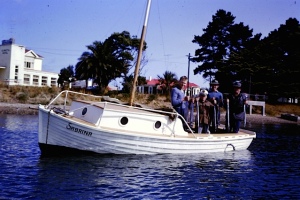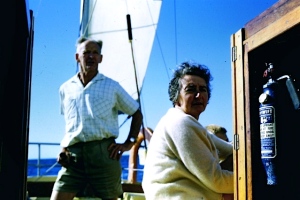Christmas, past and present
Singing carols in church began the day, then breakfast. Presents under the tree remained unopened until everyone had finished their bacon and eggs. My father always took so long, chewing every mouthful thirty times.
My grandmother and grandfather’s Christmas dinner included everyone, usually their four children and families, plus. Memories of great aunts and uncles, three great grandparents and Miss Benjifield. The films of these joyful celebrations, that my Uncle Henry took, show the oldest generation gradually diminishing with the next generation expanding, so we continued to fill the large T shaped tables.
My grandfather carved the turkey. My grandmother divvied out baked vegetables, gravy and succulent new peas from the garden. An enormous Christmas pudding then arrived with much, ‘Oohing and Aahing.’ Homemade ice cream, whipped cream and fresh strawberries and raspberries accompanied it. Finding a sixpence in our pudding was exciting, even if we weren’t keen on eating it. Uncle John, a baptist minister, was insistent he didn’t get a coin, so my grandmother would inform him he must have swallowed it, as she had seen to it that he’d had one. My grandmother was presbyterian, so no alcohol was consumed at her house.
After dinner other relatives and friends came for afternoon tea. This was set up out in the garden where folding chairs were placed under the decorated jacaranda tree. The oldest generation sat ensconced in their semicircle watching. Reflected light lit their soft white wrinkled faces, shadowed by their sunhats and veils.
How I took so much for granted, accepting the traditions as if food appeared by magic.
In the nineteen seventies my mother took over the Christmas Day preparations when my widowed, arthritic grandma became too old and infirmed. Mum managed seamlessly. Having five children who multiplied with eleven grandchildren, plus some waifs and strays, the laden table seemed limitless. Miss Nichols replaced Miss Benjifield. My father included alcohol in to the festivities.
We continued the traditions. My father was reluctant to go to church, though he always joined us on Christmas Day. One year the whole family sat in our usual pew. On the way out the minister said to my father, ‘And who are you?’
He replied,
‘I’ll give you three guesses,’ and walked on, grinning at mum.
My enchanted childhood invigorates me to try harder. Christopher and I have five children between us. They each have partners and children. Nobody lives locally. Families from afar must stay. Two boys live in the city, an hour away, which means they come for the day. Others live further afield so it is special when we all gather to catch up on all those stories that haven’t been shared due to the business of modern living.
Love remains the kernel of this sacred day. We try to minimise the commercial hype and have time to listen and talk to one another and enjoy the children’s excitement. Mobile phones and ipads have become unnecessary distractions.
Customs remain, such as: food preparations, weeding and cleaning. I think of my mother and my grandmother. How could they remain so calm and tolerant, never complaining? Were they like me? I gather my thoughts and hope I haven’t forgotten anything. Christopher has repaired two woodworm eaten legs of the outdoor table. Visualising poinsettias as the centerpiece on the table, I pretend nil desperandum and try to remain serene. Traditions change gradually and will continue to change. We shall make the most of our time and attempt to create happy memories for the next generation.
I realize that we are privileged to have grandchildren and to have family around us. Blessings and love to all of you who have had the stamina to read this and may you have a very Merry Christmas!










